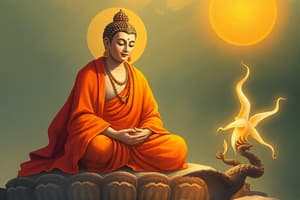Podcast
Questions and Answers
What is the foundational concept in Buddhism related to the consequences of one's actions?
What is the foundational concept in Buddhism related to the consequences of one's actions?
Karma
In Buddhism, what liberates one from the cycle of rebirth and suffering?
In Buddhism, what liberates one from the cycle of rebirth and suffering?
Enlightenment (Nirvana)
What does Ahimsa mean in Jainism?
What does Ahimsa mean in Jainism?
Nonviolence
What is the concept shared by Buddhism and Jainism related to the cycle of rebirth?
What is the concept shared by Buddhism and Jainism related to the cycle of rebirth?
What is the central idea in Jainism about nonviolence?
What is the central idea in Jainism about nonviolence?
What concept emphasizes engaging in a livelihood that does not harm others?
What concept emphasizes engaging in a livelihood that does not harm others?
What are the Four Noble Truths in Buddhism?
What are the Four Noble Truths in Buddhism?
What is the central practice in Buddhism that embodies wisdom and moral conduct?
What is the central practice in Buddhism that embodies wisdom and moral conduct?
Name the first two components of the Noble Eightfold Path in Buddhism.
Name the first two components of the Noble Eightfold Path in Buddhism.
What concept in Buddhism refers to the law of moral causation and the ethical principle of cause and effect?
What concept in Buddhism refers to the law of moral causation and the ethical principle of cause and effect?
What term in Buddhism refers to the cycle of birth, life, death, and rebirth?
What term in Buddhism refers to the cycle of birth, life, death, and rebirth?
In the context of Buddhism, what does 'Ahimsa' refer to?
In the context of Buddhism, what does 'Ahimsa' refer to?
Flashcards are hidden until you start studying
Study Notes
Exploring Buddhism and Jainism: Common Themes and Distinct Perspectives
Buddhism and Jainism are two ancient Indian philosophies that have deepened our understanding of life, suffering, and enlightenment. Both share a strong emphasis on spiritual growth, compassion, and nonviolence, yet they subtly differ in their approaches. In this exploration, we'll delve into several core concepts, namely: the Four Noble Truths, the Noble Eightfold Path, Karma, Ahimsa, and Samsara across these traditions.
The Four Noble Truths
The Four Noble Truths are at the heart of Buddhism's teachings. They are:
- Dukkha: Suffering, pain, or dissatisfaction is an inherent part of life.
- Samudaya: The causes of suffering are rooted in cravings and desires.
- Nirodha: Suffering can be eliminated by ending cravings and desires.
- Magga: The Eightfold Path, which leads to the cessation of cravings and desires, provides the path to ending suffering.
The Noble Eightfold Path
Buddhism's central practice is the Eightfold Path, which embodies wisdom and moral conduct. These are:
- Right View: Understanding the Four Noble Truths and the nature of reality.
- Right Intention: Cultivating wholesome intentions and eliminating unwholesome ones.
- Right Speech: Speaking truthfully, avoiding lies, and refraining from hurtful speech.
- Right Conduct: Abstaining from unwholesome actions, such as killing, stealing, and sexual misconduct.
- Right Livelihood: Engaging in a livelihood that does not harm others.
- Right Effort: Developing the mind and working towards the realization of enlightenment.
- Right Mindfulness: Remaining conscious and paying attention to one's thoughts, feelings, and surroundings.
- Right Concentration: Developing meditative absorption and one-pointedness of mind.
Karma
Karma, or action, is a foundational concept in Buddhism. Each action, whether good or bad, leads to a karmic consequence, which shapes one's destiny. By practicing mindfulness and understanding karma, one can work towards freeing oneself from the cycle of suffering and rebirth (Samsara).
Ahimsa
Ahimsa, meaning nonviolence, is a central tenet in Jainism. Ahimsa is not merely the absence of physical violence but a broader concept that encompasses nonviolence in thought, word, and deed. Jains believe that all living beings possess a life force (jiva) and that harming other beings can lead to negative karmic consequences.
Samsara
Samsara, or the cycle of rebirth, is a concept shared by Buddhism and Jainism. According to these traditions, the cycle of rebirth perpetuates suffering and is fueled by unwholesome actions and cravings. Enlightenment (Nirvana) liberates one from the cycle of rebirth and suffering.
Buddhism and Jainism share many similarities, particularly in their emphasis on nonviolence and the need to transcend suffering. However, they differ in their approaches to the cessation of suffering and the nature of enlightenment. Buddhism emphasizes the Four Noble Truths and the Eightfold Path, while Jainism focuses on Ahimsa and the understanding of Samsara. Both traditions offer profound insights into the nature of life and the path to liberation, inspiring millions of people worldwide.
Studying That Suits You
Use AI to generate personalized quizzes and flashcards to suit your learning preferences.




